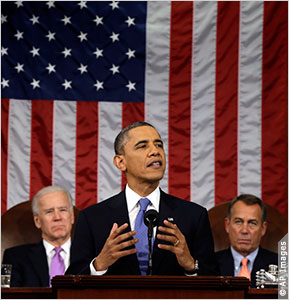Washington — President Obama, in a nationally televised address to the American people, pledged to gradually withdraw 34,000 troops from Afghanistan over the next year, further reduce the U.S. nuclear arsenal, and launch a revamped immigration system.
Obama also announced plans to launch talks for a free-trade agreement with the 27-member European Union. The president also pledged that the United States will remain “a beacon to all who seek freedom.”
“We can say with confidence that America will complete its mission in Afghanistan and achieve our objective of defeating the core of al-Qaida,” Obama said February 12 in his seventh address before a joint session of the U.S. Congress.
It was Obama’s first State of the Union address since winning re-election in November 2012. It provided a platform for the president to challenge the Congress to work with him for his second-term agenda that includes significant domestic and international goals.
The United States has already reduced its troop level in Afghanistan by 33,000, and is working to transition security responsibilities fully to Afghan troops by the end of 2014.
“This spring, our forces will move into a support role while Afghan security forces take the lead,” Obama said. “I can announce that over the next year, another 34,000 American troops will come home from Afghanistan. ... By the end of next year, our war in Afghanistan will be over.”
By the end of February 2014, the United States will have approximately 32,000 troops remaining in Afghanistan to help support, train and equip Afghan soldiers, and further troop reductions will continue through the end of 2014 as the Afghan National Army assumes full responsibility for the nation’s security. No final determination has been made about how many U.S. forces will remain in Afghanistan after 2014; the president continues to consider various options with his military advisers.
U.S. military commanders in Afghanistan will be given full latitude and flexibility in determining the pace of troop reductions. The plan gives military planners a sizable force for the next fighting season, which ends in September and October, the White House said.
In an agreement worked out between Obama and Afghan President Hamid Karzai in January, Afghan troops are scheduled to move into the lead security role beginning this spring as part of an accelerated transition plan.
Without citing specific numbers, Obama promised Americans he would continue his efforts to make the world nuclear-free, a crucial component of his national security agenda. He first announced his goal for a nuclear-free world during a speech in Prague in June 2009.
In the months after that speech, the president negotiated the New START Treaty with Russia to limit deployed nuclear arsenals to approximately 1,550 by 2018. White House officials said February 12 that the president intends to take that number down further, and the president said he will engage Russia to seek further reductions in both nations’ arsenals.
After North Korea conducted its third nuclear weapons test earlier February 12, Obama pledged to renew efforts to convince the reclusive regime to abandon plans to develop a nuclear arsenal and the long-range missiles to deliver them.
“Provocations of the sort we saw last night will only further isolate them as we stand by our allies, strengthen our own missile defense, and lead the world in taking firm action in response to these threats,” he added.
Likewise, Obama said Iran must recognize that now is the time for a diplomatic solution to end its efforts to develop nuclear weapons. “A coalition stands united in demanding that they meet their obligations, and we will do what is necessary to prevent them from getting a nuclear weapon,” the president said.
To boost American exports and trade while also supporting an expansion of jobs in the United States, Obama said he intends to complete negotiations for the Trans-Pacific Partnership with Asia-Pacific nations.
Obama also announced plans to launch comprehensive talks for a Trans-Atlantic Trade and Investment Partnership with the European Union, “because trade that is free and fair across the Atlantic supports millions of good-paying American jobs.”
In addition, the United States will join with allies to eradicate extreme poverty in the next two decades by connecting more people to the global economy and empowering women, Obama said. And the United States will work to help save the world’s children from preventable deaths, and realize the promise of an AIDS-free generation.
Obama told Congress that real immigration reform means stronger border security, putting more U.S. Border Patrol agents on the southern border with Mexico, and further reducing illegal crossings.
“Real reform means establishing a responsible pathway to earned citizenship — a path that includes passing a background check, paying taxes and a meaningful penalty, learning English, and going to the back of the line behind the folks trying to come here legally,” he said.
“And real reform means fixing the legal immigration system to cut waiting periods and attract the highly skilled entrepreneurs and engineers that will help create jobs and grow our economy,” he added.
On domestic issues, Obama proposed government action in education, manufacturing, infrastructure, clean energy and climate change, and limitations on firearms.

